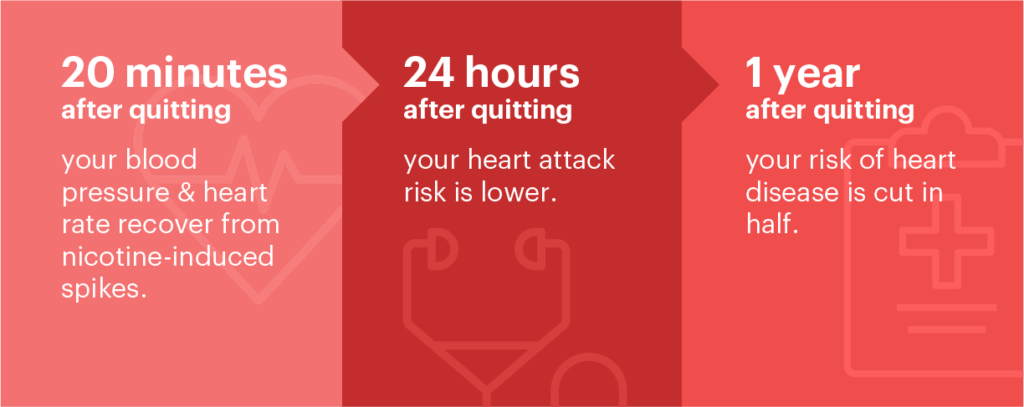February is American Heart Month

February is American Heart Month, so it’s the perfect time to reflect on how your heart health is impacted by tobacco use. Did you know that cardiovascular disease (CVD) is the single largest cause of death in the United States, and that it kills more than 700,000 people every year?1 About 1 in 3 of those CVD deaths are from smoking.2
Smoking causes changes in your heart and blood vessels that lead to CVD, including raising triglycerides (a type of fat in your blood), lowering HDL (“good” cholesterol), and causing plaques and clots to form in blood vessels that limit blood flow. Unfortunately, any amount of smoking — even light or occasional — can damage the heart and blood vessels.3 In fact, secondhand smoke can cause CVD, even in people who don’t smoke.4,5
It’s Never Too Late to Quit Smoking
Dumping cigarettes once and for all will do your heart a world of good, not to mention your friends’ and family’s hearts. By quitting smoking, you can6:
- Reduce your risk of developing and dying from heart disease.
- Lower your risk for plaques (atherosclerosis) and blood clots in your blood vessels over time.
- Help reverse heart and blood vessel damage.
And most importantly, no matter how much or how long you’ve smoked, it’s never too late to quit.7
The Benefits of Quitting Are Immediate
By quitting smoking, you’re giving yourself and your loved ones the gift of a happier, healthier heart. And that gift starts literally within minutes of quitting. Here’s what you can expect:
- After 20 minutes of not smoking, your heart rate will drop.8
- After 12 to 24 hours of not smoking, the carbon monoxide level in your blood will drop to normal, improving the distribution of oxygen to vital organs like your heart.8
- After 1 year of not smoking, your risk from heart disease will be cut in half.9
- After 4 years of not smoking, your risk of stroke will drop to that of people who never smoked.9

This February, take the first step toward a heart-healthy, smoke-free life by making a plan to quit smoking. Your heart and your loved ones will be forever grateful!
CDPHP® can help you get started on your quit journey. We have a variety of smoking cessation programs available for all our members, the newest of which is Pivot, a personalized, self-paced smartphone app available at no cost to eligible members.
References
1. Virani SS, Alonso A, Benjamin EJ, Bittencourt MS,Callaway CW, Carson AP, et al. Heart disease and stroke statistics—2020 update: a report from the American Heart Association external icon. Circulation. 2020;141(9):e139–e596.
2. U.S. Department of Health and Human Services. Smoking and Cardiovascular Disease (Fact Sheet). Atlanta, GA: U.S. Dept of Health and Human Services, Centers for Disease Control and Prevention, National Center for Chronic Disease Prevention and Health Promotion, Office on Smoking and Health; 2014.
3. U.S. Department of Health and Human Services. How Tobacco Smoke Causes Disease: The Biology and Behavioral Basis for Smoking-Attributable Disease: A Report of the Surgeon General. Atlanta, GA: U.S. Department of Health and Human Services, Centers for Disease Control and Prevention, National Center for Chronic Disease Prevention and Health Promotion, Office on Smoking and Health; 2010.
4. U.S. Department of Health and Human Services (USDHHS). The Health Consequences of Involuntary Exposure to Tobacco Smoke: A Report of the Surgeon General. Atlanta, GA: U.S. Department of Health and Human Services, Centers for Disease Control and Prevention, Coordinating Center for Health Promotion, National Center for Chronic Disease Prevention and Health Promotion, Office on Smoking and Health; 2006.
5. U.S. Department of Health and Human Services (USDHHS). The Health Consequences of Smoking—50 Years of Progress: A Report of the Surgeon General. Atlanta, GA: U.S. Department of Health and Human Services, Centers for Disease Control and Prevention, National Center for Chronic Disease Prevention and Health Promotion, Office on Smoking and Health; 2014.
6. Smoking and Your Heart https://www.nhlbi.nih.gov/healthtopics/smoking-and-your-heart. Accessed January 13, 2021.
7. Thun MJ, Carter BD, Feskanich D, Freedman ND, Prentice R, Lopez AD, Hartge P, Gapstur SM. 50-year Trends in Smoking-related Mortality in the United States..N Engl J Med. 2013; 368:351–364. doi: 10.1056/NEJMsa1211127.
8. U.S. Department of Health and Human Services (USDHHS). The Health Consequences of Smoking: What It Means to You (Consumer Booklet). Atlanta, GA: U.S. Department of Health and Human Services, Centers for Disease Control and Prevention, National Center for Chronic Disease Prevention and Health Promotion, Office on Smoking and Health; 2004.
9. Tobacco: Health Benefits of Smoking Cessation https://www.who.int/news-room/q-a-detail/tobacco-healthbenefits-of-smoking-cessation#:~:text=1%20year%2C%20your%20risk%20of,to%2015%20years%20after%20quitting. Published online Feb. 25, 2020. Accessed Jan 13, 2021.
 The Daily Dose
The Daily Dose
Comments are closed.